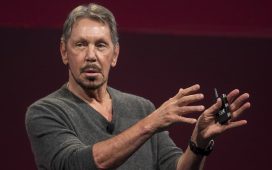Gruff, iconoclastic and relentlessly on-message, Bernie Sanders thrilled the progressive left when he ran for president in 2016 and came within striking distance of capturing the Democratic nomination.
This time around, Sanders’ ideas are shaping the policy debate in the race for the party’s 2020 nomination, but the 77-year-old senator finds himself struggling to stand out in a younger and more diverse field of candidates.
His once-sturdy second-place standing in the polls has slipped. This quarter, Sanders was out-raised by Elizabeth Warren, his closest ideological rival who has also rejected high-dollar fundraisers.
“Bernie’s ideas aren’t just Bernie’s any more,” said Carolyn Fiddler, the communications director for the progressive politics blog the Daily Kos. “The conversation that he brought to 2016 – the issues that he brought to 2016 – have been co-opted by other candidates. And he alone does not represent the progressive wing of the Democratic party.”
And in Miami last month, in the first Democratic presidential debate, Sanders was largely overshadowed by the clash between the former vice-president Joe Biden, seen as the current frontrunner, and Senator Kamala Harris of California, who has been rising in profile and polls.
Squeezed by questions over electability and a deep desire among Democrats to elevate women and people of color, Sanders is attempting to reset the debate on his own terms.
Last week, he vigorously defended his signature Medicare for All healthcare proposal, sharpening the battle lines over an issue that is animating the Democratic presidential race.
“Now is the time not for tinkering around the edges,” Sanders said, an implicit reference to candidates like Biden, who oppose the plan. “Now is the time to do what every other major country on earth does, now is time to do what the American people want us to do, now is the time to pass a Medicare for All, single-payer program.”
In his remarks, Sanders also challenged his rivals to join him in rejecting campaign donations from lobbyists, executives and political action committees of health insurance and pharmaceutical companies.

This pledge targets Biden, whose campaign has accepted money from healthcare executives, according to publicly available financial reports, and includes an aide who has previously lobbied on behalf of pharmaceutical companies and a hospital association.
“Candidates who are not willing to take that pledge,” Sanders said, “should explain to the American people why those corporate interests believe their campaigns are a good investment.”
In many ways, the speech also served to distinguish Sanders on a central campaign issue from the other candidates, several of whom have backed his healthcare plan or versions of it.
“He’s saying this is his issue,” said the progressive strategist Rebecca Katz. “It doesn’t mean that the other candidates aren’t also for Medicare for All, but this speech shows voters that he is willing to fight for it harder than anyone else in the race.”
Next week Sanders will appear on a debate stage with Warren. The pair have so far dispatched questions about their rivalry by emphasizing their friendship – and allies of both camps see little to be gained by turning on one another.
Sanders’ campaign leaders say they are unfazed by the shifting dynamics of the nomination contest at this early stage.
“Progressives know where he stands. They understand the man and they understand his mission,” said Nina Turner, the former Ohio state senator who is co-chair of his campaign.
She added: “Whether it’s Medicare for All, student debt or raising the minimum wage to $15 an hour, these issues are now part of the mainstream discussion because Senator Sanders had the courage to put them there.”

The senator has maintained a devoted base of voters, and entered July with more money than any other Democratic candidate – long-term advantages that could prove crucial.
And he has addressed shortcomings from his first run, building a campaign led by women and people of color. He has also made inroads with African Americans and sharpened his message on racial justice. Yet he has struggled to expand his support.
Yvette Simpson, the chief executive of the political action committee Democracy for America, said Sanders won the battle of ideas in 2016 – now his challenge is to offer a plan for achieving his vision. Less preacher and more prophet, she suggested.
“The question isn’t whether we trust his motivation. It’s: will he show us the way?” she said. “Can he pivot from being a cheerleader to being the guide?”
In 2016, Democracy for America endorsed Sanders after he won support from a supermajority of its membership. But a new poll of its members showed Warren and Harris encroaching on Sanders’s top spot.
“We need to hear a different voice from him, too,” Simpson said. “We know he’s a fighter and a champion in the issues. But we need to see the emotive and personal side of him.”
Sanders dislikes talking about himself, which he believes distracts from the issues driving his campaign. But as he’s challenged by candidates with compelling biographies, some advisers hope he’ll tell more of his personal story – as he did when he launched his 2020 campaign, at rallies in Brooklyn, where grew up poor in a rent-controlled apartment, and in Chicago, where he joined the civil rights movement as a college student.
The Sanders campaign believes its path to the nomination rests on its success in “expanding the electorate” – engaging non-traditional and disaffected voters and turning them into supporters.
Their approach consists of novel organizing tactics, such as “distributed organizing” that trains volunteers to host events, phone bank and register voters, as well as efforts to turn out his supporters on picket lines and protests.

Last week Sanders joined a protest against the planned closure of a hospital in Philadelphia that serves low-income people – a stop he made a day after skipping Netroots Nation, the annual progressive conference held there last week.
And the campaign is proud that after Sanders confronted Walmart executives at their annual shareholders’ meeting, the company’s workers were the most frequent contributors by employer to his campaign.
Maurice Mitchell, the national director of the Working Families party, said: “It’s going to be essential for anybody who wins to be deeply committed to building a multiracial movement that leaves no working person unconsidered. Every single working person is going to matter. That’s the challenge and the test.”
As Trump and Republicans escalate their assault on Democrats, accusing them of being a party of “socialists” with a vision for the country that is not only “extreme” but un-American, Biden and an increasingly punchy group of lower-tier moderate candidates are betting that centrism and compromise – not socialism – will win the day.
Healthcare has emerged as the latest front in that fight.
In Iowa, Biden, who has proposed a healthcare plan that would expand the Affordable Care Act, called Sanders’ Medicare for All proposal “a little risky”. Other presidential hopefuls, such as the Colorado senator Michael Bennet, former congressman John Delaney and former Colorado governor John Hickenlooper, have also sought to boost their profiles by assailing Sanders’ healthcare plan.
“My worry is the rest of the Democratic party following Bernie Sanders over this cliff,” Bennet said at a forum in Iowa, “re-electing Donald Trump instead of creating conditions where we can actually work to provide universal healthcare in this country.”

Sanders, who has long railed against corporate interests, an elite media, the so-called Democratic establishment and, more recently, authoritarianism, welcomes with relish a fight over his politics and his policies.
In an interview with the New York Times, Sanders accused Biden of “distorting” his plan and said that his criticism sounded like it could have been leveled by Trump – or the healthcare industry.
“Let me make a prediction,” Sanders said during his speech last week. “In order to defeat the Medicare for All movement, powerful special interests will be spending millions on 30-second television ads, full-page magazine ads, and corporate-sponsored ‘studies’ to frighten the American people about Medicare for All – which is exactly what happened before the passage of Medicare in the 1960s.”
“But they failed then,” he continued, reaching a thundering pitch. “And they’re going to fail now.”






